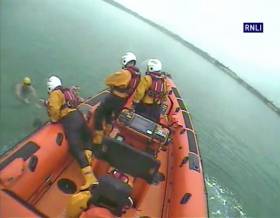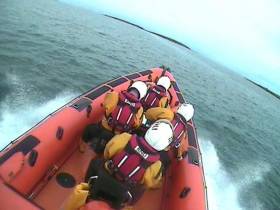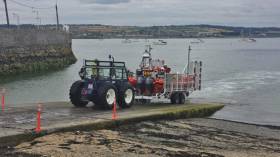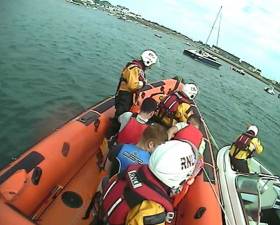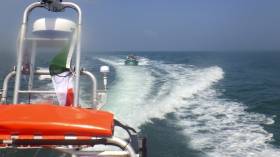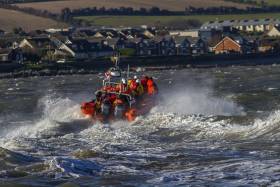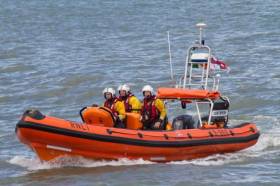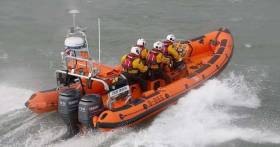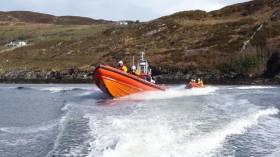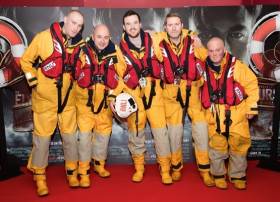Displaying items by tag: Skerries
Skerries Lifeboat Rescues Swimmer Near Colt Island
#RNLI - Skerries RNLI responded yesterday afternoon (31 October) to reports of swimmers in difficulty to the south of Colt Island off the north Co Dublin town.
Shortly after 12 noon, a member of the local fishing fleet alerted Dublin Coast Guard that several swimmers appeared to be having difficulty returning to shore.
Skerries RNLI volunteers launched the lifeboat, with Peter Kennedy at the helm and crewed by Gerry Canning and Steven Johnston, all of whom were already in the station attending a casualty care course when the pager sounded.
Arriving on scene, the crew quickly located a male and a female swimmer, with a fishing vessel standing by them.
The male swimmer had been dragged further out to sea than intended and, with the effects of the cold water starting to set in, was struggling to swim against a strong current.
The female swimmer was in no difficulty and had gone to assist him. She was also able to tell the crew that two other swimmers who had been in the area had made it ashore themselves.
Both swimmers were taken on board the lifeboat, and the woman was dropped ashore to retrieve her belongings. However, the man was very cold and the crew decided he should be brought back to the station for further assessment.
He was brought into the warmth of the station by members of crew on the shore who began to treat him for mild hypothermia. As a precaution, he was then checked over by Skerries RNLI’s honorary medical officer, Dr Seamus Mulholland.
After a short time, the man was well enough to be on his way and the Skerries lifeboat volunteers returned to their casualty care training.
Speaking after the callout, Skerries RNLI lifeboat press officer Gerry Canning said: “The speed of response is crucial in cases like this as the effects of cold water can cause a casualty’s condition to worsen quite quickly.
“You won’t get a much quicker launch than when there is already a full crew in the station training when the pagers sound.”
Skerries Lifeboat Launches To Boat With Fouled Propeller
#RNLI - Skerries RNLI volunteers launched their Atlantic 85 inshore lifeboat on Thursday evening (28 July) to reports of a 21ft boat with a fouled propeller south of Rush Harbour.
A person on board the stricken vessel had contacted one of the volunteer crew and informed them that they had fouled their propeller and were anchored south of the harbour.
The crew were paged shortly after 8.30pm, and the lifeboat was quickly launched with Joe May as Helm and crewed by Rob Morgan, Peter Kennedy and Simon Shiels.
As the lifeboat was en route, the crew received an update to say that the casualty vessel had managed free their propeller and return safely to Rogerstown Estuary. The lifeboat was stood down and returned to station.
Speaking after the callout, Skerries RNLI lifeboat press officer Gerry Canning said: "Things can go wrong at sea, even for the most experienced seafarers. That’s why it is important to always have the correct equipment on board.
"In this case a good anchor gave [the casualty vessel and its crew] the time they needed to get themselves out of trouble."
The callout was the third in a week for the Skerries inshore lifeboat, after it launched to reports of swimmers in difficulty last Saturday 23 July, and rescued four from a speedboat grounded on rocks at Colt Island the previous Thursday (21 July).
Skerries Lifeboat Launches To Swimmer In Difficulty
#RNLI - Skerries RNLI volunteers launched their Atlantic 85 inshore lifeboat on Saturday afternoon (23 July) after Dublin Coast Guard received a call from a concerned member of public about a swimmer in difficulty.
The lifeboat launched shortly after 12.30pm with Philip Ferguson at helm and crewed by Emma Wilson, Steven Johnson and AJ Hughes, after a swimmer was reported having difficulty returning to shore at the swimming area known locally as The Captains.
Within minutes the lifeboat was on scene, but there was no sign of any swimmers in the area. Before a search could be started Dublin Coast Guard received a second call to confirm that the swimmer had made it ashore and was safe and well. The lifeboat was stood down and returned to station.
Speaking after the callout, Skerries RNLI lifeboat press officer Gerry Canning said: :The member of the public who called Dublin Coast Guard was genuinely concerned for the swimmer and was right to make the call.
"Thankfully in this case our assistance wasn’t required, but our volunteer crew are always ready to respond to anyone in difficulty at sea."
The callout came two days after the Skerries lifeboat rescued four men from a speedboat grounded on rocks at Colt Island, as previously reported on Afloat.ie.
Skerries Lifeboat Rescues Four From Speedboat On Rocks
#RNLI - Skerries RNLI launched yesterday afternoon (Thursday 21 July) after Dublin Coast Guard received a call from a vessel that had suffered engine failure near the islands off the North Co Dublin coastal town.
The lifeboat launched shortly after 4.30pm and proceeded to the general area indicated by the casualty vessel.
Arriving on scene, the volunteer crew spotted the speedboat, which had been pushed on to the rocks at Colt Island by the wind and tide. At the time there was a Force 3-4 south-westerly wind and a slight swell.
The lifeboat was carefully positioned to transfer a crew member to the casualty vessel. A tow was established and the boat, with four men on board, was towed clear of the rocks into safer water.
Upon inspection there did not appear to be any major damage to the hull so the tow was continued, returning them safely to Skerries Harbour.
Speaking after the callout, Skerries RNLI lifeboat press officer Gerry Canning said: "Thankfully the lifeboat reached them quickly as the situation was deteriorating quite quickly.
"However, all four were wearing lifejackets and crucially they were able to contact the shore for help."
Skerries Lifeboat Tows Motorboat To Safety Off Malahide
#RNLI - Skerries RNLI responded yesterday afternoon (Saturday 28 May) to reports of a motorboat adrift with engine difficulties some four miles east of Malahide Estuary.
Skerries RNLI volunteers launched the lifeboat shortly before 2pm when Dublin Coast Guard tasked them to assist the boat, with four men on board, that was experiencing engine trouble.
Those on board the casualty vessel was able to provide the coastguard with GPS co-ordinates for their position.
As a result the lifeboat, with volunteer Joe May at the helm and crewed by Steven Johnson and Laura Boylan, were able to proceed directly to the vessel.
The motorboat was then taken under tow by the lifeboat and returned safely to Howth. Conditions at the time were clam with a slight sea fog.
Speaking after the callout, Skerries RNLI lifeboat operations manager Gerry Canning said: "Everyone on board was wearing a lifejacket and they were able to give us their exact location. Even the most prepared can encounter difficulties at sea.
"We would just like remind people that if they are in difficulty or see others who may be in difficulty to dial 999 and ask for the coastguard."
Skerries RNLI is currently on the lookout for new volunteers to join its 18-strong crew, as previously reported on Afloat.ie.
Skerries RNLI Seeks New Volunteer Crew Members
#RNLI - Skerries RNLI is looking for new volunteer crew members to join its search and rescue service in North Co Dublin.
The station currently has 18 lifeboat and three shore crew to cover its service on the north east coast of Dublin but is now calling on new volunteers to come forward and find out how they can get involved in helping the charity continue to save lives at sea.
Skerries RNLI has over 100 years' aggregate service and has been operating as an inshore lifeboat station for over 25 years. The current Atlantic 85 lifeboat – Louis Simson, placed on service 2013 – provides cover for part of the East Coast of Ireland.
Last year, the lifeboat in Skerries launched 10 times, bringing 16 people to safety. This week alone it launched twice, to rescue three swimmers caught in a rip current and a young man on a personal water craft with engine difficulties.
Niall McGrotty, Skerries RNLI lifeboat operations manager, is calling on any volunteers who may be interested to get in touch and find out more.
"We are looking for anyone aged 17 years and over, working or living in Skerries, who is willing to offer some of their free time to join what I believe to be, one of the most exhilarating and rewarding voluntary services that is out there.
"Ideally we are looking for volunteers with daytime availability. Every volunteer receives first-class training from the RNLI and learns new skills which can benefit them in many walks of life.
"Lifeboat crew members need to have a reasonable level of fitness, have good eyesight and not be colour blind. Anyone who would like to volunteer but feels they would not meet the requirements for lifeboat crew should in no way be put off, as shore crew also play an essential role in the launch and recovery of the lifeboat when it goes on service."
Anyone who feels they have the time and commitment to volunteer for the charity on call 24 hours a day, 365 days a year is asked to contact the station at [email protected] or Niall McGrotty at 087 241 8967.
Skerries Lifeboat Assists Teen On Personal Water Craft
#RNLI - Skerries RNLI responded Sunday evening (15 May) to reports of a personal water craft in distress off the Martello tower in Loughshinny.
Dublin Coast Guard tasked Skerries RNLI just after 6pm having receiving a 999 call about a person on a personal water craft who appeared to be signalling for help.
The location was given as being in line with the Martello tower situated on a headland near Loughshinny Harbour.
The lifeboat was launched with volunteer Eoin Grimes at the helm and crewed by Emma Wilson, Steven Johnson and AJ Hughes.
Arriving on scene, the crew quickly located the casualty, a 17-year-old whose personal watercraft had encountered mechanical difficulties and was drifting.
The teenager was taken on board the lifeboat and his vessel was taken under tow. He was returned to Portmarnock beach where he had friends waiting to offer assistance. The lifeboat then returned to station.
Speaking after the callout, Skerries RNLI lifeboat operations manager Niall McGrotty said: "With the good weather meaning more people are taking to the sea, we would like to remind people that it is advisable to have their vessels fully serviced after the winter and to always carry a means of contacting the shore."
Skerries RNLI responded this afternoont to reports of swimmers in difficulty off a local swimming area known as The Springers.
The pagers sounded shortly before midday after Dublin Coast Guard received reports that a number of swimmers were caught in a rip current and were unable to get back to shore.
Skerries RNLI volunteers launched the lifeboat with David Knight at the Helm and crewed by Philip Ferguson, Emma Wilson and AJ Hughes.
Arriving on scene the crew discovered that there were four casualties in the water spread over a large area in between Red Island headland and Colt Island. The lifeboat quickly began recovering the casualties into the lifeboat.
With a large sea swell running and the casualties suffering from fatigue and early symptoms of hypothermia, it was necessary for one of the Skerries RNLI volunteers, Philip Ferguson to enter the water to assist them in getting on board.
Once all the casualties were on board the lifeboat returned to the station and recovered immediately to the warmth of the boathouse. Once inside the boathouse the casualties were assessed, monitored and treated for mild hypothermia but were all fit and well leaving the station.
Skerries Coast Guard unit and the Coast Guard helicopter Rescue 116 were also tasked. The helicopter stood by while the lifeboat recovered the casualties from the water.
Speaking after the call out, Gerry Canning, Volunteer Lifeboat Press Officer for Skerries RNLI said: ‘Rip currents are a major cause of accidental drowning on beaches across the world. Even if you know an area well, the currents may change based on the weather and tides. The speed of response is crucial in cases like this and our volunteers did an excellent job in getting there as safely and quickly as possible. ’
East Meets West As Skerries Lifeboat Crew Visits Clifden
#RNLI - Skerries RNLI's volunteer crew headed to the West of Ireland this month as they paid a visit to their colleagues in Clifden RNLI.
Once a year the volunteers in Skerries undertake a team-building and fact-finding trip to other rescue services and lifeboat stations.
Despite being located on opposite sides of the country, Skerries RNLI and Clifden RNLI had previously exercised together, along with Clogherhead RNLI, off the East Coast back in 2014.
On that occasion the Clifden crew were being trained on the Mersey-class all-weather lifeboat that the station took on for a 12-month trial.
Last Saturday (16 April), Clifden RNLI launched all three of their lifeboats – a Mersey-class, an Atlantic 85 inshore lifeboat and a D-class inshore lifeboat – to take the volunteers from Skerries afloat and give them a taste of the challenges they faced on the West Coast and at their own station in particular.
Skerries RNLI would like to thank volunteers Philip Ferguson and Laura Boylan for organising the trip; Irish Rail, who very generously subsidised the travel costs; and most importantly all, the volunteers at Clifden RNLI for giving up their time and extending a warm welcome.
Speaking about the exercise, Skerries RNLI volunteer lifeboat press officer Gerry Canning said: "It’s always a great learning experience for our volunteers to see the challenges that face other crews around the coast, and how they deal with them.
"The guys from Clifden RNLI were fantastic and really pulled out all the stops to make sure we went afloat and got a good insight into why they require each of their boats."
RNLI Volunteers Walk The Red Carpet At Gala Screening Of 'The Finest Hours'
#RNLI - Volunteer lifeboat crew from three RNLI stations in Dublin were in Dundrum on Wednesday evening (17 February) for the Irish gala screening of Disney's latest action film The Finest Hours.
Volunteers Gerry Canning and Eoin Kelly from Skerries RNLI, Manus O’Donnell from Howth RNLI and Paul Cummins and Jack Shanahan from Dun Laoghaire RNLI were invited to swap lifeboats for the limelight as they shared the red carpet with guests at the high-action movie premiere at Dundrum Town Centre.
The film tells the incredible true story of the heroic 1952 SS Pendleton rescue mission carried out by the US Coast Guard which is still regarded as one of the greatest sea rescues of all time.
The Finest Hours is based on the acclaimed non-fiction book of the same name by Michael J Tougias and Casey Sherman, which tells the tale of true events that took place 64 years ago this week.
Presented in Digital 3D and IMAX 3D, the film will transport audiences to the heart of the action, creating a fully-immersive cinematic experience on an epic scale.
Owing to the long and close relationship that the RNLI holds with the US Coast Guard, it was highly appropriate for Disney and the RNLI to work together in Ireland, while helping to raise awareness of the charity’s lifesaving work.
The Dublin crew, dressed in full all-weather lifeboat kit, ushered guests to their cinema seats where ahead of the movie, they watched a hard-hitting advertisement from the RNLI’s national drowning prevention campaign, Respect the Water.
The campaign which was first launched last summer warns people that coastlines and waters can be dangerously unpredictable.
The 60 second commercial entitled ‘Breathe’ is shown from the point of view of the casualty, played by an actor. The narrator Andy Serkis invites the audience to hold its breath while watching the film, as the casualty struggles and succumbs to the effects of cold water shock in the time the audience is holding their breath.
The film reveals that, on land, the average person can hold their breath for 45 seconds – but in cold water, they might not last 10.
Speaking following the gala screening, Gerry Canning from Skerries RNLI said: "It was great to see such strong parallels between the bravery, selflessness and community spirit shown by the characters in the film which is mirrored by RNLI lifeboat crew all around Ireland.
"It’s not unusual for us to be woken up by our pagers on a normal week night, so an evening of glitz and glamour was a nice change."
In 2015, RNLI lifeboat crews – who are on-call 24/7, 365 days a year – launched 1,098 times rescuing 1,244 people.
The RNLI has been operating since 1824 and has continually shared expertise, advice and training knowledge with the US Coast Guard for over 100 years.
RNLI volunteers also attended gala screenings of the film in Galway, Cork and Limerick last night.
The Finest Hours will open in Irish cinema today (Friday 19 February). Watch the trailer below.


























